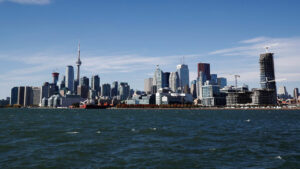By Justine Irish D. Tabile, Reporter
A BUSINESS delegation from Canada consisting of 300 members is visiting the Philippines next month to explore collaborations in food security, clean technology, infrastructure, and information and communications technology (ICT), the Canadian embassy said.
At a briefing on Thursday, Senior Trade Commissioner Guy Boileau said that this will be the largest Trade Mission Canada has sent, dwarfing the contingents sent elsewhere to Asia.
“This is the biggest Team Canada Trade Mission that we have done. It is bigger than the delegations sent to Japan and Korea,” Mr. Boileau told reporters.
“It speaks to the interest of Canada at large in engaging with the Philippines,” he added.
He said potential investors are interested in the Philippines’ growing economy, English-speaking population, young demographics, and significant economic reforms.
“This is a great country that is seen increasingly as a hub in terms of servicing other countries in the region,” he said.
“This is also a country that is English speaking, so it makes things much easier. You also have a very young and very tech-savvy population, and those are elements that resonate when we talk to our companies,” he added.
He said the standout reforms are the amendments to the Public Service Act and Public-Private Partnership Code, the liberalization in key sectors such as renewable energy, and the passage of the Corporate Recovery and Tax Incentives for Enterprises to Maximize Opportunities for Reinvigorating the Economy (CREATE MORE).
“Those are all very positive signals to international investors and exporters, including those in Canada, that at the end of the day are looking for a stable and predictable business environment,” he said.
“And what we have seen over the past few years is that the Philippines is indeed going in that direction. That’s quite interesting and promising for partnerships and collaboration,” he added.
The trade mission, which will run from Dec. 4 to 6, will also be attended by 20 industry associations, including the Business Council of Canada and the Canada-ASEAN Business Council.
“In addition to that, we have representation from most of our provinces and territories. In fact, we have a minister from the province of Alberta who is also joining the delegation,” he said.
“The delegation is (composed) of approximately 60% small and medium enterprises (SMEs) and 20% to 30% large Canadian companies. So this is really important because we know the importance that the Philippines attaches to supporting and scaling up SMEs,” he added.
The delegation will explore priority industries aligned with the objectives of the administration, such as food security, clean technology, infrastructure, and ICT.
“We have companies coming in from agro-industrial solutions and the process food and beverage as well. Within clean tech, we (have delegation members involved in) energy efficiency, water and wastewater management, decarbonization, carbon capture, and so on,” he said.
“The third priority sector is infrastructure. We know that this is very important for President Marcos. So we do have companies that are coming in from this sector specifically on master planning, engineering, and nuclear energy,” he added.
ICT will be represented by companies in the financial technology solutions, satellite communications, cybersecurity and artificial intelligence industries.
“Those are the four priority sectors of the Team Canada Trade Mission. We have other sectors that are also joining. We have companies in defense, aerospace and education,” he said.
The delegation will include Canadian companies that have not yet been significantly involved with the Philippines, he noted.
Mr. Boileau said that international trade plays a key role in the Canadian economy, which points to the importance of diversifying trade.
“When we talk about growth in the Canadian economy, we cannot talk about that without talking about international trade, and that includes the importance of trade diversification,” he said.
“We do know that over-concentration may not always be a good thing, so we do try to provide a platform and rules so that our companies can tap into as many global markets as possible,” he added.
He said negotiations for the ASEAN-Canada free trade agreement are currently ongoing and are set to be concluded next year.
“We have had several rounds of negotiations. Our leaders have committed to concluding those negotiations by the end of 2025,” he said.
Meanwhile, Andrew Green, political and public affairs counselor at the Canadian Embassy, said that the trade mission is part of Canada’s Indo-Pacific strategy declared two years ago.
“This trade mission is part of the Indo-Pacific strategy announced in 2022. So it is disconnected from what has happened in the electoral campaign in the States and the next administration,” he said.
“I would not link those two together. But certainly, a focused trade in the Indo-Pacific will help Canada balance against any particular disruptions around the international system,” he added.

